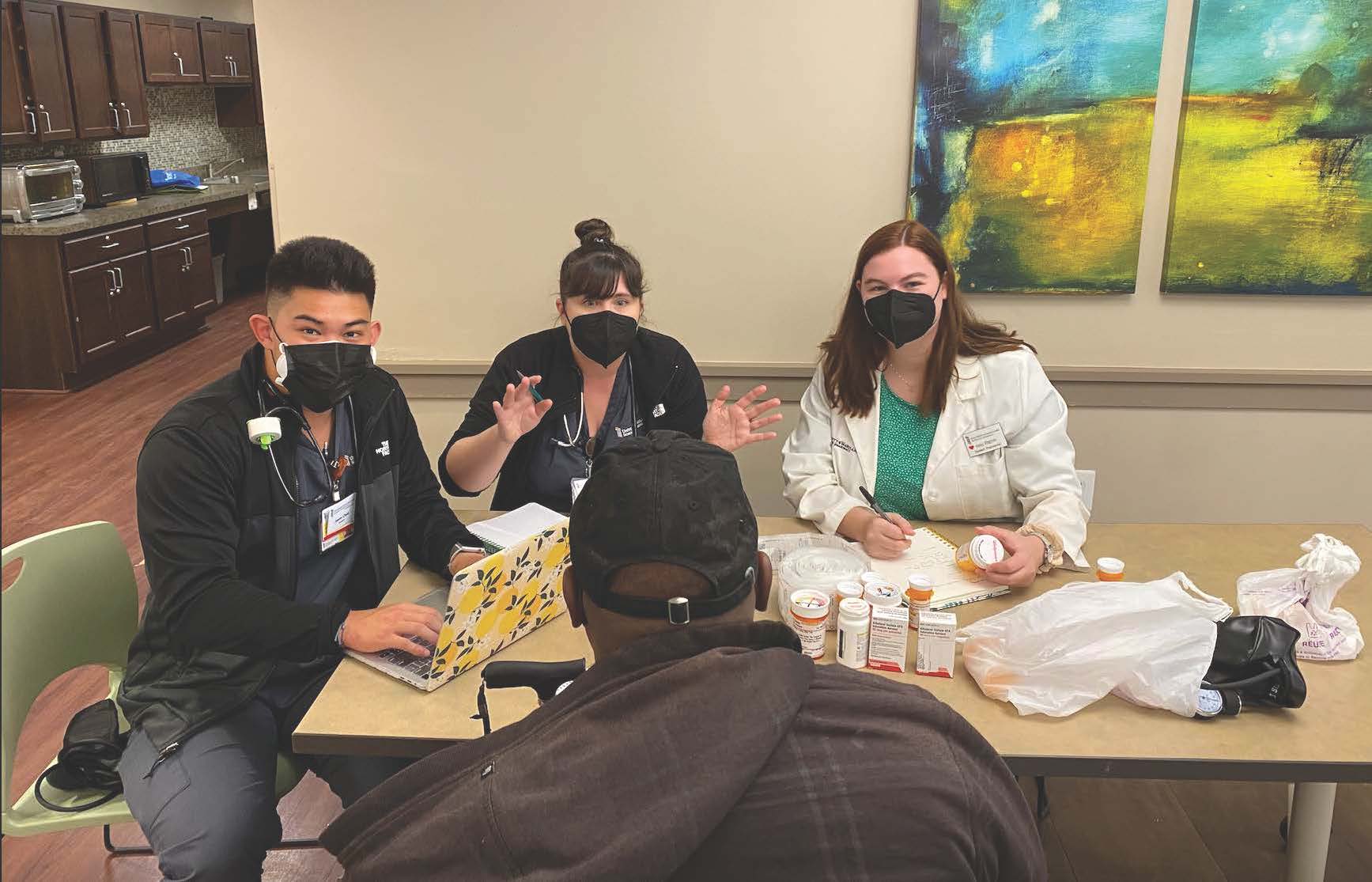Hearing Loss: An Under-Addressed Problem in Underserved West Baltimore
August 17, 2022 Daniel Mansour, Eric Hoover, Ronna Hertzano, and Nicole Brandt
Interprofessional student collaboration has the potential to help patients overcome obstacles and access hearing health care.
As part of the Interprofessional Education (IPE) Care in Geriatrics Aging in Place course offered each semester, PHMY5011/CIPP621, students from various health professions make weekly visits to older neighbors in underserved communities throughout Baltimore. During these visits, incidental hearing loss was identified while screening for high-risk medications, blood pressure checks, or simply from neighbors reporting that they have communication difficulty related to hearing loss. Older adults and their families have told of a more significant impact of hearing loss during the COVID-19 pandemic. Factors contributing to this perceived difficulty include the use of masks, increased distance and physical barriers between communication partners, and greater reliance on video conferencing technology for personal and telehealth communication. Lip-reading, an essential communication skill, has been compromised by the mask mandates that block the visibility of the face.
Hearing Challenges Older Adults Face
One-third of older adults in the United States between the ages of 65 and 74 and one-half of older adults 75 and older have some hearing loss. These numbers are expected to continue to rise due to the aging population. Hearing loss is associated with impaired communication and balance and an increased risk for dementia, falls, hospitalization, and early mortality. The risk of dementia is up to five times greater, and the risk of falling is up to three times greater in adults with hearing loss left untreated. To mitigate these risks, it is crucial for older individuals with hearing loss to be identified and triaged to achieve hearing health. When an individual’s hearing capacity is sufficient for functional needs and successful interaction with their environment, he/she has reached hearing health.
As our population ages, finding innovative ways to increase access to hearing care is imperative. Hearing care includes services that fall under the prevue of multiple healthcare professionals, including otolaryngologists (for diagnosis and treatment of medical disorders of the ear), audiologists (hearing and fitting with appropriate devices), speech-language pathologists (management of communication disorders resulting from hearing loss), and many others. It is known and accepted that hearing care improves health outcomes in patients with hearing loss; however, many patients do not access hearing care for various reasons.
Meet Mrs. A
Mrs. A is a delightful 94-year-old lady who lives by herself in her apartment in West Baltimore. On Thursday afternoons, Mrs. A comes down to meet the interprofessional students with the IPE Care in Geriatrics Aging in Place program. Mrs. A has had her hearing aids for about three years but has barely worn them, although she still pays their monthly installments. When asked, Mrs. A stated that they were hard to maintain every two weeks and needed to buy a new battery, an expense that can add up in light of her tight budget and soaring prices. The students immediately made phone calls to the audiology clinic that provided the initial service but also to their colleagues at the University of Maryland College Park and others. In the end, they connected her with an audiology service that was closer to home, arranged transportation, and scheduled a follow-up for education and reinforcement. Two months later, Mrs. A is back with the team with brand new behind-the-ears (BTE) hearing aids, this time with rechargeable batteries. “THANK YOU!” says Mrs. A and her daughter in one voice with joy radiating from their eyes. “You are God-sent. You were able not only re-connect mom with a very well-needed audiology provider but also supported her as she has gotten used to wearing them again. The quality of our time together has been greatly enhanced; we are SO Grateful for your services!”
As illustrated by Mrs. A, the primary barrier to hearing care is the high cost of hearing aids. Still, some older adults believe hearing loss is an inevitable part of aging that does not require care, and others do not know how to access hearing care. Finally, some older adults are reluctant to use hearing aids or even obtain consultation regarding hearing loss due to a perceived negative stigma.
The Collaboration
IPE Care in Geriatrics Aging in Place (PHMY 5011/CIPP 621) is a 1-, 2-, or 3-credit elective course available to all students at the University of Maryland, Baltimore (UMB); University of Maryland, College Park (UMCP); and other universities. Students learn with, from, and about each other to provide outcome-driven and person-centered care to older adults in the community. Obtaining hearing aids through an audiologist typically requires multiple office visits, which creates a barrier for patients who have difficulty traveling to the office because of health, mobility, limited transportation options, or other concerns. During the era of COVID-19, tele-audiology solutions are increasingly available but there continue to be significant barriers. Misconceptions about the cost of hearing care can be a barrier to access by deterring patients from seeking hearing care.
Conclusion
Hearing loss can have a significant impact on patients’ quality of life. Older adults are at an increased risk of experiencing hearing impairment but often do not seek help from healthcare providers. As the population ages, increasing access to screening has never been more relevant, and early identification of hearing loss is key to effective management. Interprofessional student collaboration has the potential to help patients overcome obstacles and access hearing healthcare.
Reference
Students from all UMB and UMCP programs can enroll in course number PHMY5011/CIPP621.
Authors
Daniel Z. Mansour, PharmD, BCGP, FASCP, AGSF; Eric C. Hoover, PhD; Ronna Hertzano, MD, PhD; Nicole J. Brandt, PharmD, MBA, BCGP, BCPP, FASCP.